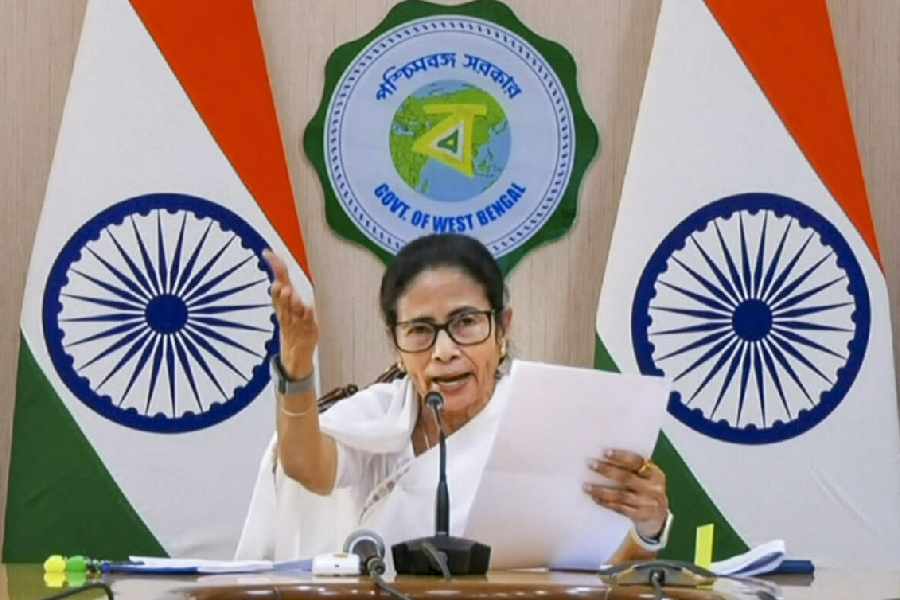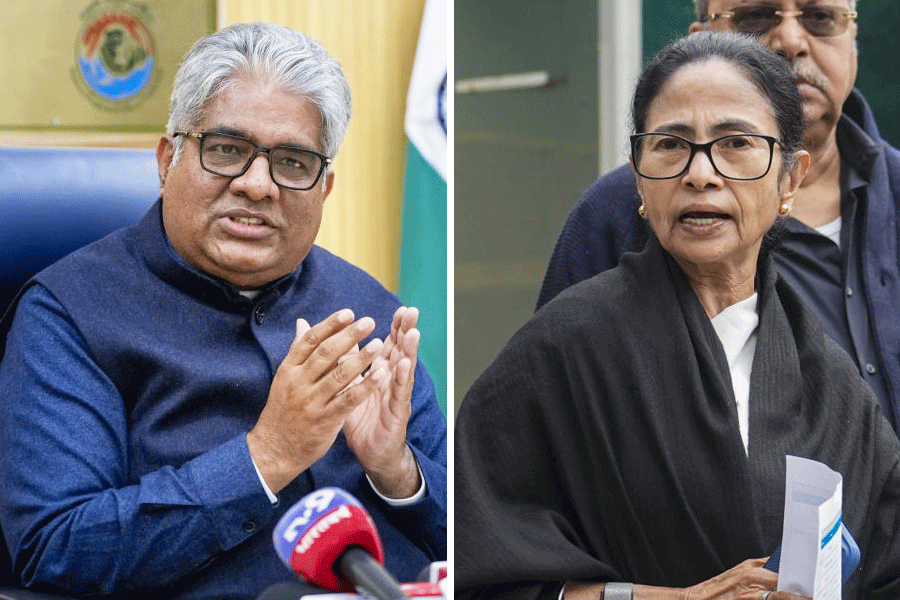|
|
Ten years ago today, we set out to see a late afternoon screening of Dil Chahta Hai. It was about six-thirty when we returned. As we parked in the drive, still debating the suitability of Saif Ali Khan’s romantic interest in the movie, I heard, through the open window of my mother’s bedroom, the unaccustomed accents of BBC World. This was unusual because my mother usually caught up with the news later in the evening at eight. I glanced through the window as my wife opened the front door and saw the second plane fly into the South Tower of the World Trade Center.
My nephew worked in an investment bank in the World Trade Center, so I spent the rest of the evening trying to call him. I finally got through to his wife who said he had been late going in to work that morning and had been safe in a subway train when the planes hit.
We bookmark catastrophe with remembered trivia. I was on my knees by a radio when the BBC announced Mrs Gandhi’s killing on the last day of October in 1984. Later that day, I was in an autorickshaw approaching Kamal Cinema when I saw a young man boarding a stationary DTC bus through the driver’s window: it’s how I remember the start of the anti-Sikh pogrom in south Delhi. When the Babri Masjid was being razed by organized Hindu mobs on December 6, 1992, Doordarshan said nothing, Akashvani maintained its usual lying radio silence and it was the BBC World Service (again) on a bad, static-ridden frequency that brought me news of the pre-meditated vandalism that would change India’s politics forever.
You need no help from hindsight in deciding if an event is historical; you just know because its aftermath remakes your life as you watch, because everyone around you can talk of nothing else, because old friendships end over violent disagreements. With 9/11, this was true in a grotesque way. The four planes, the symbolically freighted targets (the WTC, the Pentagon and the Capitol), the unthinkably violent spectacle of skyscrapers being levelled by aeroplanes… it was as if a hideously gifted event management company had staged a world-historical happening.
No one I knew, spoke or wrote or argued about anything else immediately after the 9/11 attacks and the millions of words written and spoken then were a strange brew of Schadenfreude and sympathy, fear and loathing. People critical of American foreign policy offered the historical context of American imperialism as an explanation. 9/11 by this account was retribution: having sown the wind, America was reaping the whirlwind. Others saw the attempt to find geo- political reasons for the suicidal hijackings, sinister and misleading, a mitigation, almost, of the evil cult of death that had made such wickedness possible.
One thing is certain: it was the most successful act of provocation the world had seen since the assassination of the Archduke Ferdinand in 1914. Talk of war began at once. We now know that the secretary of state for defence, Donald Rumsfeld, began asking the same afternoon if 9/11 could be pinned on Saddam Hussein, and, while the invasion of Iraq had to wait till 2003, the invasion of Afghanistan, al Qaida’s host, began inside a month. Otherwise unhawkish people were persuaded that an invasion of Afghanistan was essential and just because the indiscriminate killing of civilians couldn’t go unpunished. People who were against the invasion offered different sorts of objections: the suffering an invasion would visit upon innocent Afghan civilians, the ideological differences between al Qaida and the Taliban, the possibility that war would trigger a famine in Afghanistan in winter, but in the event, the allies invaded in October and carried all before them.
Almost exactly a year later, my family and I moved to New York temporarily and one cold autumn morning we went as tourists to Ground Zero. I have a hazy memory of a fenced-off site with blackened structures around it. I’m not sure what I expected to find there. This was my second experience of visiting a monument that no longer existed. The first time had been in 1996 when I had visited the makeshift temple on the rubble of the razed Babri Masjid. Both sites seemed suspended in a state of oppressive limbo and both times I left with the shamed sense of being a gawker.
The two years that we lived in Brooklyn were dominated by the build up to the invasion of Iraq and its aftermath. It was an unsettling time. American newspapers and television news channels became cheerleaders for the war. A patriotism-inducing virus had collectively deranged the press so that ‘liberal’ newspapers and magazines like The New York Times and The New Yorker had begun to beat the drum for invasion and regime-change. Despite being obsessive newspaper readers, my wife and I didn’t subscribe to The New York Times, because it was impossible to read its writers collectively making the case for war. Judith Miller, a senior reporter at the NYT, helped fabricate the argument that Iraq was crowded with weapons of mass destruction. Nicholas Kristof and Bill Keller, liberal columnists, wrote like hawks on Viagra and David Remnick, the arch- liberal editor of The New Yorker came out publicly for the war. After 9/11, war and war-making was the common sense of America.
As long as the invasion of Iraq went well, it appeared as if America and its Coalition of the Willing had unilaterally remade the world order. The world’s solitary hyperpower, backed up by Nato and the Anglophone empire (white, English-speaking countries) had made the United Nations, and the multilateralism it represented, seem feeble and passé. In the summer of 2003, it looked as if George W. Bush’s America had used the tragedy of 9/11 to consolidate a new imperium.
Then things went wrong. Ten years after the towers fell, American troops in their tens of thousands still serve in Iraq and Afghanistan but they serve a lost cause and a much-diminished empire. Any reasonable audit of this decade would conclude that the two principal losers from the ‘war on terror’ have been Muslims at large and the United States of America.
The two battleground Muslim nations, Iraq and Afghanistan, have had their social fabric and physical infrastructure utterly destroyed. Two mainly Muslim countries on the sidelines of America’s wars, Pakistan and Iran, have been seriously destabilized. The civilian death tolls in Iraq and Afghanistan are so shocking that the Coalition of the Willing did everything it could to obscure them. Muslim diasporas in the Western world have suffered from guilt by association, have been racially profiled by governments and endured the suspicions of non-Muslim ‘hosts’. This in turn has made many Muslim communities defensive, resentful and susceptible to perfervid conspiracy theories.
But the damage done to America’s standing by 9/11 and the train of events that it set in motion is, if anything, even more historically significant. Ten years of war and four trillion dollars later, the solitary superpower of 2001 is a bankrupt behemoth. Its war in Iraq has created a regime closer to arch-villain Iran than America. Its war in Afghanistan looks likely to end in a covert bargain with the Taliban, one of the principal targets of the ‘war on terror’ when it was inaugurated.
The largest cost to America has been the loss of intellectual hegemony. Abu Ghraib, Guántanamo and waterboarding made it impossible for the Coalition of the Willing to claim the moral high ground. Herd hysteria, shock-jock talk radio, embedded journalism and a general complicity with the State have left Western news organizations looking as truthful as Pravda and as objective as Radio Peace & Progress. The rise of the security state in America, the matter-of-fact short-circuiting of legal due process and America’s openly avowed policy of targeted assassination has subverted America’s claim to be a nation of laws.
Perhaps the most important difference that 9/11 made to world history was that at the very moment when China was set to emerge as the world’s biggest creditor nation, America embarked on a violent course that would confirm its standing as the world’s biggest debtor. Something changed in this decade and as America sinks deeper into what looks like a double-dip recession, it’s hard not to read in its economic trajectory the signs of a longer term decline. Fifty years from now, history textbooks might teach that the American century ended on September 11, 2001.











